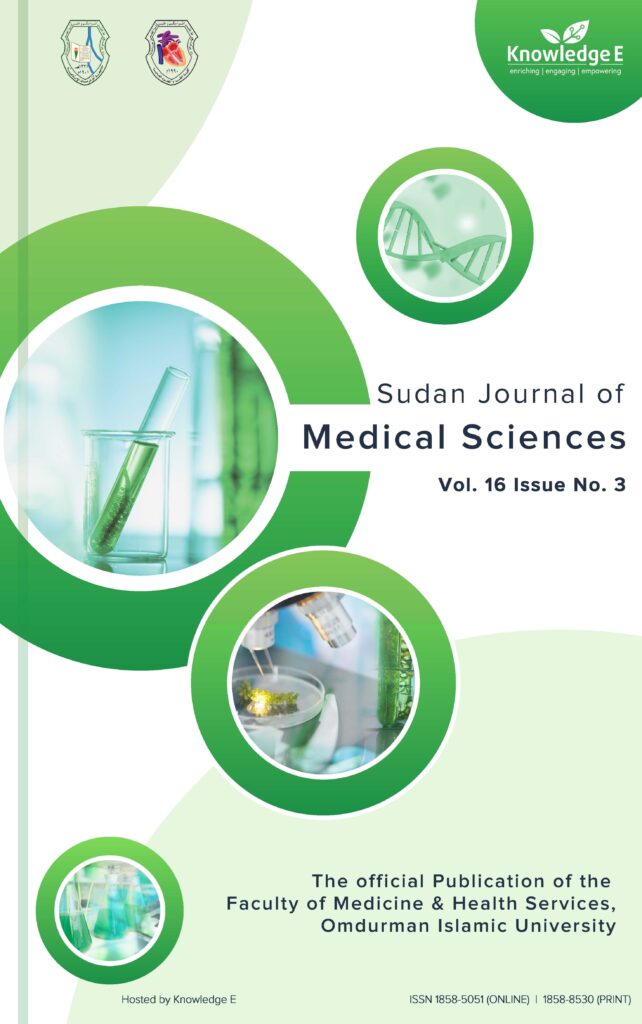
Sudan Journal of Medical Sciences
ISSN: 1858-5051
High-impact research on the latest developments in medicine and healthcare across MENA and Africa
The Effect of Innovative Teach-back Tool Kit Session on the Postgraduate Nursing Students’ Knowledge About Injectable Artesunate
Published date: Mar 31 2021
Journal Title: Sudan Journal of Medical Sciences
Issue title: Sudan JMS: Volume 16 (2021), Issue No. 1
Pages: 122 - 134
Authors:
Abstract:
Background: Injectable artesunate (inj AS) is a new anti-malarial treatment recently introduced in Sudan for the treatment of severe malaria . Inj AS has demonstrated its superiority over injectable quinine in African and Asian patients. This study aimed to evaluate the outcome of innovative teach-back tool kit session on the knowledge of inj AS among the postgraduate nursing students at the University of Khartoum, Sudan.
Methods: This interventional pre–posttest studyincluded30postgraduatenursing students selected though a full-coverage sampling method and meeting the selection criteria. Data were collected using standardized self-administered questionnaire after taking a written approval from the participants. The pretest included an initial assessment followed by implementation of interactive session about new anti-malaria treatment using an innovative teach-back toolkit, and the final assessment was conducted after two weeks (posttest). The collected data were then analyzed and interpreted using descriptive and inferential statistics based on the objective and hypothesis of the study. A two-tailed p-value at 0.05 was considered as the level of significance using SPSS version 20.
Results:
Majority of the participants were aged between 20 and 30years; of them, 26 (87%) were female and 4(13%) male, and all of them had >1year of experience. The findings of the study showed that half of the participants (15[50%]) had a good knowledge score, 12 (40%) had a poor knowledge, and 3(10%) had a very poor knowledge score in the pretest. However, the knowledge scores increased significantly to 86.7% posttest, which is very good. The overall mean of pretest knowledge scores regarding inj AS was7.4 with a statically significant difference (p=0.000). The mean score was increased to 12 with a statically significant difference posttest (p=0.000).
Conclusion:
There was a statistically significant improvement in the knowledge scores of the postgraduate nursing students about inj AS after the implementation of interactive teaching session using innovative teach-back tool kit.
Keywords:inj artesunate, teach back-toolkit, nursing students, session
References:
[1] Prochnow, J. A., Meiers, S. J., and Scheckel, M. M. (2019). Improving patient and caregiver new medication education using an innovative teach-back toolkit. Journal of Nursing Care Quality, vol. 34, no. 2, pp. 101–106.
[2] Scottish Health Council. (2014). The Participation Toolkit: Supporting Patient Focus and Public Involvement in NHS Scotland. Better Evaluation.
[3] Cobuild, C. (2008). Collins Cobuild Advanced Learner’s English Dictionary, New Digital Edition 2008©. HarperCollins Publishers.
[4] World Health Organization. (2020). Malaria: Fact Sheet. World Health Organization: Regional Office for the Eastern Mediterranean.
[5] Whitethorn, C.,Bremen, J., Daily, J., et al. (2010). Epidemiology, prevention and control of malaria in endemic areas.UpToDate.
[6] Centers forDisease Control and Prevention. (2019). Global Health-Division of Parasitic Diseases and Malaria.
[7] Centers for Disease Control and Prevention. (2016). Malaria Diagnosis & Treatment (United States). Retrieved from: www.cdc.gov.
[8] World Health Organization. (2013). Artesunate. WHO.
[9] Drugs, E. (2013). Practical guidelines intended for physicians, pharmacists, nurses and medical auxiliaries. In Essential Drugs. Médecins sans Frontières.
[10] Federal Ministry of Health, Khartoum, Sudan. (2017).Sudan Malaria Treatment Protocol.
[11] Mikomangwa, W. P., Kaaya, C., Kilonzi, M., et al. (2019). Level of knowledge among health care providers on preparation of injectable artesunate for treatment of severe malaria in public health facilities in Tanzania. BMC Research Notes, vol. 12, no. 1, p. 224.
[12] National Environment Management Council (NEMC).(). The National Environmental Research Agenda For Tanzania.
[13] Kadam, P. and Bhalerao, S. (2010). Sample size calculation. International Journal of Ayurveda Research, vol. 1, no. 1, p. 55.
[14] Khan, A. N., Khan, M. U., Shoaib, M. H., et al. (2014). Practice nurses and pharmacists: a perspective on the expectation and experience of nurses for future collaboration. Oman Medical Journal, vol. 29, no. 4, p. 271.